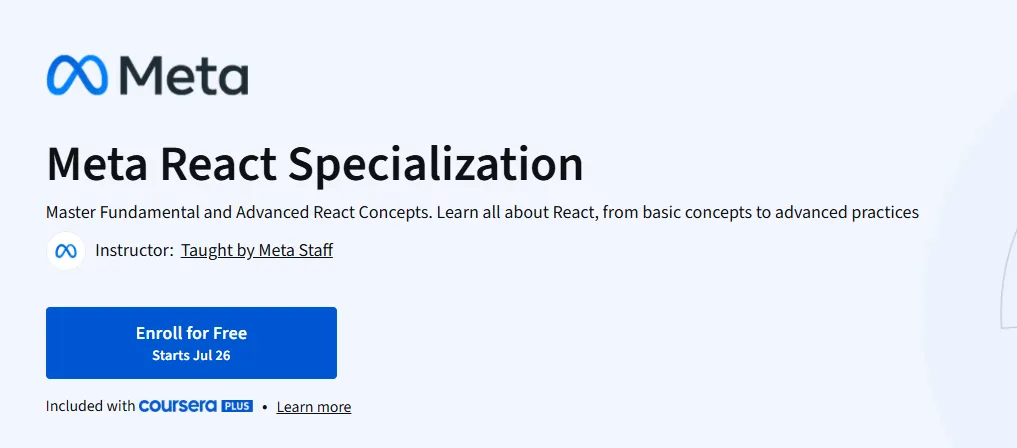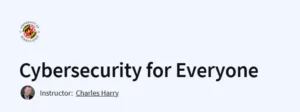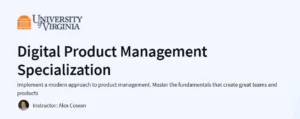Meta React Specialization
A top-tier mobile development program by Meta that takes you from JavaScript basics to deploying real-world React Native apps.
What will you learn in Meta React Specialization Course
Build mobile apps using React Native and Expo.
Implement navigation, data storage, and user interface design for iOS and Android.
Work with APIs, authentication, and mobile app deployment.
Gain job-ready skills for junior mobile app developer roles.
Program Overview
Course 1: Introduction to Mobile Development
⏱️ 3 weeks
Topics: Mobile platforms, React Native basics, app development lifecycle.
Hands-on: Build a simple cross-platform app using Expo.
Course 2: Programming with JavaScript
⏱️ 4 weeks
Topics: JavaScript ES6+, functions, objects, arrays, DOM manipulation.
Hands-on: Write interactive scripts and basic web logic.
Course 3: React Basics
⏱️ 4 weeks
Topics: Components, props, state, hooks, JSX.
Hands-on: Develop interactive user interfaces in React.
Course 4: React Native
⏱️ 4 weeks
Topics: Platform differences, UI components, gestures, APIs.
Hands-on: Build native mobile interfaces.
Course 5: React Native Advanced
⏱️ 4 weeks
Topics: Navigation, performance optimization, animations.
Hands-on: Add advanced features and multi-screen navigation.
Course 6: Version Control
⏱️ 2 weeks
Topics: Git, GitHub, versioning, branching strategies.
Hands-on: Push projects to GitHub and manage source code.
Course 7: Capstone Project
⏱️ 4 weeks
Topics: Planning, building, and showcasing a real-world mobile app.
Hands-on: Create a portfolio-ready mobile application.
Get certificate
Job Outlook
High demand for React Native developers in startups and tech firms.
Junior mobile developers can expect salaries from $60,000 to $100,000 annually.
Growing remote and freelance opportunities.
React Native reduces time-to-market by enabling cross-platform development with one codebase.
- Created by Meta (Facebook) engineers
- Covers both core and advanced React Native concepts
- Capstone project builds job-ready portfolio
- Some concepts may move fast for true beginners
- React Native apps may have limitations compared to fully native apps
Specification: Meta React Specialization
|
FAQs
- Basic knowledge of HTML, CSS, and JavaScript is recommended but not mandatory.
- The course introduces React concepts step-by-step for learners with minimal experience.
- Hands-on exercises guide learners through building functional React components.
- Beginners can gradually build confidence in creating interactive web applications.
- Supplemental tutorials may accelerate understanding of frontend development fundamentals.
- The course includes projects where learners build fully functional React apps.
- Learners practice using JSX, components, props, state, and events.
- Realistic examples simulate real-world web development workflows.
- Step-by-step guidance ensures understanding of best practices in React development.
- Hands-on projects help learners build a portfolio to showcase skills.
- Hooks such as
useStateanduseEffectare introduced and applied in projects. - Context API is taught for managing global state in React applications.
- Practical exercises show when and how to use these features effectively.
- Knowledge of hooks and context prepares learners for modern frontend development.
- Skills gained are directly applicable to professional React projects.
- React is widely used in industry for building dynamic user interfaces.
- Skills gained improve employability for frontend and full-stack development roles.
- Projects demonstrate practical ability to potential employers.
- Knowledge of React complements existing JavaScript, HTML, and CSS skills.
- Completion shows readiness to contribute to real-world web development projects.
- Estimated completion is around 4–6 months at a part-time pace.
- Weekly effort of 5–7 hours is generally sufficient for lectures and hands-on exercises.
- Regular practice in building components and projects reinforces learning.
- Revisiting assignments or experimenting with additional features may require extra time.
- Consistent engagement ensures learners develop both conceptual understanding and practical React skills.





